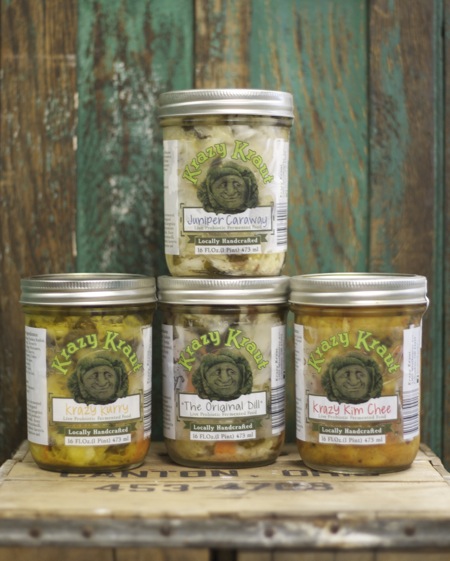Probiotics and Brain Health: Why Do Fermented Foods Make Us Feel So Good?
 We have all heard about
how probiotics help with immunity and digestion. And most of us
remember our first time trying a quality fermented food, that first
spoonful of delicious live-culture kraut, or first swig of a gourmet
kombucha, and the immediate feeling of “WOW! I feel great!” that
followed. Why do we feel so good when we eat quality fermented foods?
Well, science has been busy lately proving the connection between our
mood and our microbes, the connection between our brains and our
bacteria.
We have all heard about
how probiotics help with immunity and digestion. And most of us
remember our first time trying a quality fermented food, that first
spoonful of delicious live-culture kraut, or first swig of a gourmet
kombucha, and the immediate feeling of “WOW! I feel great!” that
followed. Why do we feel so good when we eat quality fermented foods?
Well, science has been busy lately proving the connection between our
mood and our microbes, the connection between our brains and our
bacteria.
Growing Our Internal Microbe Garden
Our bodies are like coral, an assemblage of life forms all living
together. As adults we all carry around two to five pounds of bacteria,
also known as our “microbiota” - 10 times more microbial cells than
human cells! Since we are the homes for these microbes, whether or not
we know or care, we are the owners of our “microbiome,” which is defined
as our microorganisms, the genomes they contain, and the interactions
between these microbes and our human physiology.
Most of these bacteria live in our gut, which is also home to our
second brain, the enteric nervous system. “What, we have a second
brain?” you may ask. Yes we do, and it turns out that the enteric brain
and the microbes it interacts with may be the ones really running most
of the show when it comes to our mood and dietary choices. Our second
brain, which is home to our “gut feelings,” operates separately from our
primary brain and consists of hundreds of millions of neurons contained
in our intestines that are intricately connected to our mood and our
microbes. Science is now showing the type of microbes you contain, or
do not contain, may be influencing the way you process stress and
emotions and can be the difference between a calm, happy, and centered
mood and one of depression, anxiety, and hyper-reactivity.
Our internal microbe garden contains thousands of microbe species,
and new research indicates the right combinations can affect our mental
health. Previous studies have revealed that in mice, changes in gut
microbe colonies appear to ease feelings of anxiousness and help to
control the levels of cortisol, a potent stress hormone related to
inflammation. In general, the more cortisol you have the more stressed
out and unhealthy you are. Conversely, the less cortisol we produce the
more human growth hormone we produce, the “anti-aging/good mood”
hormone attributed to longevity and disease-free living. New human
studies are being conducted all over the world that are showing the
connection between probiotics and increased ability to handle stress and
retain a good mood.
Probiotics in Fermented Foods
How to get the “right” combination of microbes? Until the
pre-historic miracle microbiome pill is developed, research shows it
would behoove us all to intentionally inoculate our systems in the
historic way by eating as many live-culture probiotic fermented foods as
possible.
Since the probiotic microbes come ultimately as starter-cultures from
soil-based microbes, when choosing dairy and vegetables for fermenting
it makes most sense to source from certified organic and biodynamic
farms, which have highest soil ecosystem diversity. Organic and
biodynamic farms must cultivate the diversity in their soil ecosystems
so that the plants are healthy enough to not need herbicides,
pesticides, and chemical fertilizers. Instead, they have immune function
strong enough to fight off the pests and competition from weeds. As
the Weston Price Foundation explains, “All health begins with the soil!”
Andy Reed has extensive experience in culinary arts
and the medicinal values of the healing energetics of foods based on
Asian Healing Food Energetics. Andy is the owner of the OEFFA-certified
organic
Krazy Kraut Fermented Foods.
Krazy Krauts are four varieties of live-culture probiotic-rich
fermented nutrient-dense vegetable and spice combinations made in
Columbus, Ohio, from vegetables grown by small Ohio organic family
farms. Andy is also a licensed acupuncturist with a specialty of
oncology and Asian healing food energetics.
References
http://www.apa.org/monitor/2012/09/gut-feeling.aspx
http://www.livescience.com/14266-gut-bacteria-behavior-irritable-bowel-syndrome-depression-anxiety-antibiotics-probiotics.html
http://www.sciencealert.com/alterning-your-gut-bacteria-could-ease-anxiety-and-depression
http://news.sciencemag.org/biology/2014/11/bodys-bacteria-may-keep-our-brains-healthy


